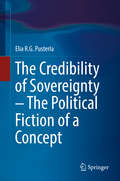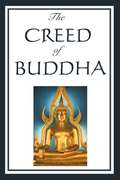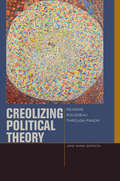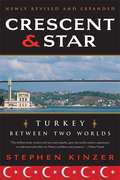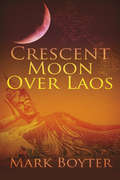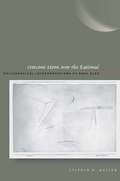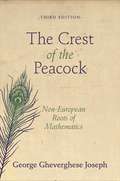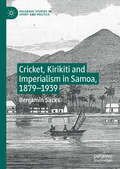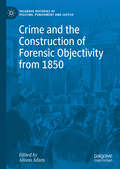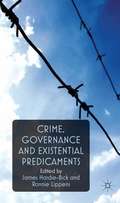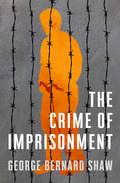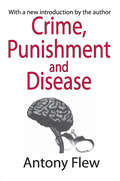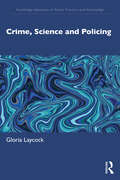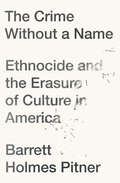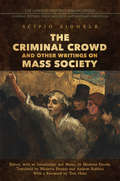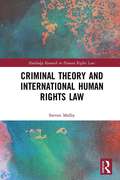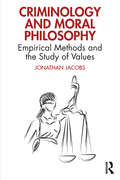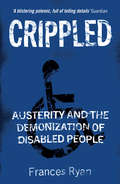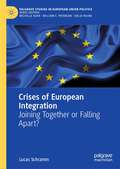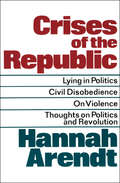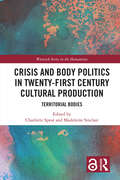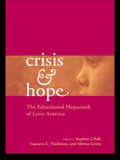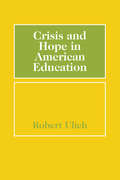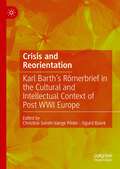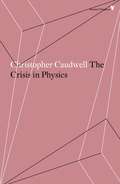- Table View
- List View
The Credibility of Sovereignty - The Political Fiction of a Concept
by Elia R.G. PusterlaThe book deeply analyses the bilateral relations between Switzerland and the European Union and their effect on the former's sovereignty in the context of Europeanisation. This touches on philosophical debates on the complexity of sovereignty. What sovereignty is at stake when talking about Swiss-EU relations? This issue not only faces the elusiveness of sovereignty as a concept, but also the proliferation of hypocrisy on its presence within states. The book encounters the deconstructionist hypothesis stating that there is nothing to worry about but the belief there is something to worry about. Derrida's deconstruction of sovereignty allows indeed one to grasp the fictional essence of sovereignty based on the metaphysics of presence. The presence of self-positing sovereign ipseity is fictional since absent in the present, but spectrally present in the belief of its presence to come. Sovereignty is a matter of credibility, or the credible promise of a normative statement to come. Hence, the book challenges the realist/neorealist argument stating that states are credibly sovereign until proven otherwise and explains that the debate on state sovereignty calls for the unveiling of this hypocritical epistemology cunningly disguised as an objective presence. Swiss-EU relations thus become the cornerstone to not only theorise but also test sovereignty and deconstruct the two ontological and epistemological sides of the same coin, or the modern hypocrisy of sovereignty. This deconstruction constitutes the very problématique of any attempt to understand whether and how a state can be sovereign and solve the problem as to how to neutralise the différance and identify the difference between credible and incredible claims of sovereignty. This problématique connects the theory and practice of sovereignty innovatively, providing positivist evidence on the arguable credibility of the Swiss claim of sovereignty and confirming the presence of a theological dimension within politics.
The Creed of Buddah
by BuddahPhilosophy is, in its essence, the quest of reality. In the attempt to determine what is real, one has to choose, in the first instance, between the percipient self and the things that it perceives. This choice may seem to be purely metaphysical, but sooner or later it becomes a moral choice and one which is decisive of the chooser's destiny.
Creolizing Political Theory: Reading Rousseau through Fanon (Just Ideas)
by Jane Anna GordonMight creolization offer political theory an approach that would better reflect the heterogeneity of political life? After all, it describes mixtures that were not supposed to have emerged in the plantation societies of the Caribbean but did so through their capacity to exemplify living culture, thought, and political practice. Similar processes continue today, when people who once were strangers find themselves unequal co-occupants of new political locations they both seek to call “home.”Unlike multiculturalism, in which different cultures are thought to co-exist relatively separately, creolization describes how people reinterpret themselves through interaction with one another. While indebted to comparative political theory, Gordon offers a critique of comparison by demonstrating the generative capacity of creolizing methodologies. She does so by bringing together the eighteenth-century revolutionary Swiss thinker Jean-Jacques Rousseau and the twentieth-century Martinican-born Algerian liberationist Frantz Fanon. While both provocatively challenged whether we can study the world in ways that do not duplicate the prejudices that sustain its inequalities, Fanon, she argues, outlined a vision of how to bring into being the democratically legitimate alternatives that Rousseau mainly imagined.
Crescent And Star: Turkey Between Two Worlds
by Stephen KinzerIn the first edition of this widely praised book, Stephen Kinzer made the convincing claim that Turkey was the country to watch -- poised between Europe and Asia, between the glories of its Ottoman past and its hopes for a democratic future, between the dominance of its army and the needs of its civilian citizens, between its secular expectations and its Muslim traditions. In this newly revised edition of Crescent and Star, he adds much important new information on the many exciting transformations in Turkey's government and politics that have kept it in the headlines, and also shows how recent developments in both American and European policies (and not only the war in Iraq) have affected this unique and perplexing nation.
Crescent Moon Over Laos
by Mark BoyterMark Boyter's Crescent Moon Over Laos is a true account travel narrative of an 18-day journey in Laos, just months after the country had been re-opened to Western travel after ten years being closed. For Boyter, after three years living and travelling in Asia, Laos was a setting both familiar and foreign, comforting and disquieting. About to return to a North America three years removed from familiarity, leaving behind an Asia that had grown into "home", dancing on the edge of a new love relationship, Laos was the lynch pin that tied these worlds together. Written in journal form, Crescent Moon Over Laos is a voyage of discovery that unfolds in the parallel stories of an emerging soul and a re-emerging country. It is about Laos and it is about a traveler: a novella in non-fiction. On the surface, Crescent Moon follows the simple story of the traveler. But like an elaborate wrought iron fence, the story filigrees off into tangential questions and observations of ethics, of personal place in the world, of self; of Asia, of Buddhism, of travel; of love and relationships, both with others and with ourselves. What begins as a travel memoir ends as a discussion of life, of what it means to be human.
Crescent Moon over the Rational
by Stephen H. WatsonWhy, and in what manner, did artist Paul Klee have such a significant impact on twentieth-century thinkers? His art and his writing inspired leading philosophers to produce key texts in twentieth-century aesthetics, texts that influenced subsequent art history and criticism. Heidegger, Adorno, Benjamin, Merleau-Ponty, Lyotard, Sartre, Foucault, Blanchot, Derrida, and Marion are among the philosophers who have engaged with Klee's art and writings. Their views are often thought to be distant from each other, but Watson puts them in conversation. His point is not to vindicate any final interpretation of Klee but to allow his interpreters' different accounts to interact, to shed light on their and on Klee's work, and, in turn, to delineate both a history and a theoretical problematic in their midst. Crescent Moon over the Rational reveals an evolving theoretical constellation of interpretations and their questions (theoretical, artistic, and political) that address and continually renew Klee's rich legacies.
The Crest of the Peacock
by George Gheverghese JosephFrom the Ishango Bone of central Africa and the Inca quipu of South America to the dawn of modern mathematics, The Crest of the Peacock makes it clear that human beings everywhere have been capable of advanced and innovative mathematical thinking. George Gheverghese Joseph takes us on a breathtaking multicultural tour of the roots and shoots of non-European mathematics. He shows us the deep influence that the Egyptians and Babylonians had on the Greeks, the Arabs' major creative contributions, and the astounding range of successes of the great civilizations of India and China. The third edition emphasizes the dialogue between civilizations, and further explores how mathematical ideas were transmitted from East to West. The book's scope is now even wider, incorporating recent findings on the history of mathematics in China, India, and early Islamic civilizations as well as Egypt and Mesopotamia. With more detailed coverage of proto-mathematics and the origins of trigonometry and infinity in the East, The Crest of the Peacock further illuminates the global history of mathematics.
Cricket, Kirikiti and Imperialism in Samoa, 1879–1939 (Palgrave Studies in Sport and Politics)
by Benjamin SacksThis book considers how Samoans embraced and reshaped the English game of cricket, recasting it as a distinctively Samoan pastime, kirikiti. Starting with cricket’s introduction to the islands in 1879, it uses both cricket and kirikiti to trace six decades of contest between and within the categories of ‘colonisers’ and ‘colonised.’ How and why did Samoans adapt and appropriate the imperial game? How did officials, missionaries, colonists, soldiers and those with mixed foreign and Samoan heritage understand and respond to the real and symbolic challenges kirikiti presented? And how did Samoans use both games to navigate foreign colonialism(s)? By investigating these questions, Benjamin Sacks suggests alternative frameworks for conceptualising sporting transfer and adoption, and advances understandings of how power, politics and identity were manifested through sport, in Samoa and across the globe.
Crime and the Construction of Forensic Objectivity from 1850: Space, Media, Experts And Ethics (Palgrave Histories of Policing, Punishment and Justice)
by Alison AdamThis book charts the historical development of 'forensic objectivity' through an analysis of the ways in which objective knowledge of crimes, crime scenes, crime materials and criminals is achieved. Taking an interdisciplinary approach, with authors drawn from law, history, sociology and science and technology studies, this work shows how forensic objectivity is constructed through detailed crime history case studies, mainly in relation to murder, set in Scotland, England, Germany, Sweden, USA and Ireland. Starting from the mid-nineteenth century and continuing to the present day, the book argues that a number of developments were crucial. These include: the beginning of crime photography, the use of diagrams and models specially constructed for the courtroom so jurors could be ‘virtual witnesses’, probabilistic models of certainty, the professionalization of medical and scientific expert witnesses and their networks, ways of measuring, recording and developing criminal records and the role of the media, particularly newspapers in reporting on crime, criminals and legal proceedings and their part in the shaping of public opinion on crime. This essential title demonstrates the ways in which forensic objectivity has become a central concept in relation to criminal justice over a period spanning 170 years.
Crime, Governance and Existential Predicaments
by James Hardie-Bick Ronnie LippensThis collection focuses on the existential predicaments and choices that underpin current debates and developments in the governance of crime and criminal justice and argues for the relevance of existentialist thought for enhancing a critical and philosophically inspired criminological imagination.
The Crime of Imprisonment
by George Bernard ShawThe Nobel Prize–winning social critic examines the absurdities and moral indignities of modern incarceration in this classic work. Best known for his theatrical works of biting social satire, George Bernard Shaw was also a committed political activist who, at various times, found himself in conflict with the law. Though he was never arrested, Shaw was deeply concerned with the experience of imprisonment and its debilitating effects on inmates. In this polemical study of the contemporary prison system, Shaw dismantles many of the standard arguments for harsh prison sentences. He argues that the impulse for retribution is at odds with the goal of reform, and that prison often fosters greater criminality rather than acting as a deterrent.
Crime, Punishment and Disease in a Relativistic Universe
by Antony FlewIn Crime, Punishment and Disease, Antony Flew makes clear both the meaning and the implications carried by the application of the expression "mental disease." He aims to discourage its use in conditions that provide the victims of such diseases with an excuse for failing to perform what would have been their imperative duties had they enjoyed good mental health. Flew attacks the gross over-extensions of the notion of mental disease on both sides of the Atlantic. He defends human dignity and responsibility against the suggestion that we are all, or most of us, "sick, sick, sick." In particular, he challenges the paternalist pretensions of people who claim a right to control and manipulate others because they are allegedly sick, and consequently not responsible for what they do.In a typical ordinary disease, Flew notes, it is the patient who complains of the disease rather than someone else who complains about the patient. But those who claim that some crime or all crime is symptomatic of mental disease and those who identify disorders such as attention/deficit/hyperactivity disorder (ADHD) as conditions requiring psychiatric attention are taking the disfavored behavior rather than the distress of their patients as the warrant for supposedly medical interventions. They should instead first consider how what they propose to call mental disease does, and does not, resemble syphilis, measles, and other communicable diseases.Flew sees his work as complementary to Thomas Szasz's. He applies a philosophical perspective to problems Szasz discusses as a psychiatrist. This work will be of particular interest to students of philosophy and politics, in that it relates modern discussion of mental illness to the Plato of The Republic. Flew also takes note in this context of Samuel Butler's Erewhon. This work will be of direct relevance to criminologists, as well as those interested in social welfare, philosophy of education, and new developments in psychiatry.
Crime, Science and Policing
by Gloria LaycockThis book offers an introduction to crime science; it is specifically for police and security professionals. Written by one of the founders of crime science and an expert in crime reduction, it considers the unique characteristics of the approach, its applicability to the control of crime, disorder and terrorism, and the importance of experimentation and the testing of new ideas to build a knowledge base for ethical policing. Core content includes: The basics of crime science in concept, theory and practice; Methods of research and assessment used by crime scientists; Crime science and policing, including its application to volume crimes, serious crimes and investigation; Legitimacy and public compliance; Policing, science, and future crimes. This book is essential reading for all students of professional policing, as well as those interested in crime and its control, reduction, and prevention.
The Crime Without a Name: Ethnocide and the Erasure of Culture in America
by Barrett Holmes PitnerIn this incisive blend of personal narrative and philosophical inquiry, journalist and activist Barrett Holmes Pitner seeks a new way to talk about racism in America.Can new language reshape our understanding of the past and expand the possibilities of the future? The Crime Without a Name follows Pitner&’s journey to identify and remedy the linguistic void in how we discuss race and culture in the United States. Ethnocide, first coined in 1944 by Jewish exile Raphael Lemkin (who also coined the term "genocide"), describes the systemic erasure of a people&’s ancestral culture. For Black Americans, who have endured this atrocity for generations, this erasure dates back to the transatlantic slave trade and reached new resonance in a post-Trump world. Just as the concept of genocide radically reshaped our perception of human rights in the twentieth century, reframing discussions about race and culture in terms of ethnocide can change the way we understand our diverse and rapidly evolving racial and political climate in a time of increased visibility around police brutality and systemic racism. The Crime Without a Name traces the historical origins of ethnocide in the United States, examines the personal, lived consequences of existing within an ongoing erasure, and offers ways for readers to combat and overcome our country&’s ethnocidal foundation.
The Criminal Crowd and Other Writings on Mass Society (Lorenzo Da Ponte Italian Library)
by Nicoletta Pireddu Tom Huhn Scipio SigheleThe Criminal Crowd and Other Writings on Mass Society is the first English collection of writings by Italian jurist, sociologist, cultural and literary critic Scipio Sighele. Sighele is largely responsible for providing post-unification Italy with a new outlook on issues ranging from the blurring line between individual and collective accountability, the role of urbanization in the development of criminality, and the emancipation of women. This work draws a multifaceted portrait of a provocative thinker and public intellectual caught between tradition and modernity during the European fin de siècle. Containing a comprehensive introduction by the editor, The Criminal Crowd and Other Writings on Mass Society includes Sighele’s seminal work, The Criminal Crowd, as well as his formative studies on group behaviour. Nicoletta Pireddu contextualizes Sighele’s contribution to the so-called ‘age-of crowds,’ from the fierce polemic with his French rivals Gustave LeBon and Gabriel Tarde to the scientific, literary, and cultural developments of his conceptualization of mass behaviours as a legitimate object of psychological investigation into a new century.
Criminal Theory and International Human Rights Law (Routledge Research in Human Rights Law)
by Steven MalbyThe development of an international human rights jurisprudence on criminalization is in its relative infancy. Nonetheless, systematic examination of international decisions on acts engaging the criminal law reveals an emerging human rights approach to the acceptability, or not, of criminalization. This book provides an in-depth characterization of the reasoning and principles that underpin those decisions. The work builds upon and adds value to existing literature by bringing together two fields of study – international human rights law and criminal theory – that usually receive separate treatment. It provides an in-depth analysis of human rights criminalization jurisprudence and presents a systematic identification of underlying reasoning and concepts that influence international human rights decisions on criminalization. The work thus advances both fields independently, as well as providing an example of inter-(sub)disciplinary analysis. The book will be a valuable resource for academics and students working in the areas of International Human Rights Law, Criminal Law, and Moral Philosophy.
Criminology and Moral Philosophy: Empirical Methods and the Study of Values
by Jonathan JacobsThe book examines some of the most important forms of normativity and the relation between facts and values in the context of criminological investigation. In recent decades numerous criminologists have argued that criminology needs to be more explicitly concerned with normative considerations and with morality and this book explains the plausibility of that view and of empirically rigorous non-positivist study of moral values. Hume is often regarded as a key figure in separating facts from values and he was a formidable opponent of moral rationalism. Yet, in his own moral philosophy he sought to explicate the genuineness and authority of moral considerations without endorsing some implausible positivist interpretations of a putative fact/value distinction. The significance of Hume’s view and its implications for the empirical study of morality are explored. The book discusses several layers of normativity explored by criminological investigation including: The relation between law and morality the concept of the Rule of Law the normativity of the notion of criminality the justification of sanction the presence and significance of moral considerations This book will be of interest to students taking upper-level courses on criminal justice ethics, punishment, political theory, jurisprudence, and social philosophy.
Crippled: Austerity And The Demonization Of Disabled People
by Frances RyanThe austerity crisis and threat to disability rightsIn austerity Britain, disabled people have become the favourite target. From social care to the benefits system, politicians and media alike have made the case Britain’s 12 million disabled people are a drain on the public purse. In Crippled, leading commentator Frances Ryan exposes the disturbing reality, telling the story of those most affected by this devastating regime. This includes a paralyzed man forced to crawl down the stairs because the council wouldn’t provide accessible housing; the malnourished woman sleeping in her wheelchair; and the young girl with bipolar forced to turn to sex work to survive. Through these personal stories, Ryan charts how in recent years the public attitude towards disabled people has transformed from compassion to contempt: from society’s “most vulnerable” to benefit cheats. Crippled is a damning indictment of a safety net gone wrong, and a passionate demand for an end to austerity measures hitting those most in need.
Crises of European Integration: Joining Together or Falling Apart? (Palgrave Studies in European Union Politics)
by Lucas SchrammThe book offers explanations for the striking variation in the outcomes of European integration crises. It analyzes eight major cases over the entire integration process, starting from the early 1950s and lasting until very recently. All cases went beyond a single policy field or member state but affected key features, principles, and objectives of European integration. As such, they qualify as “constitutional crises”. My cases comprise the crisis of the European Defence Community (1952-54); the empty chair crisis (1965-66); the oil crisis (1973-74); the budgetary rebate crisis (1979-84); the end of the Cold War crisis (1989-92); the Constitutional Treaty crisis (2004-07); the Euro crisis (2009-12); and the migration crisis (2015-16). Taking a historical-comparative perspective, the book shows that crises have been an integral part of the European integration process since its beginning. European integration, after all, started with a major setback when member states in 1954 failedto realize plans for a European army through the European Defense Community.
Crises of the Republic: Lying in Politics, Civil Disobedience, On Violence, Thoughts on Politics and Revolution (Pelican Ser.)
by Hannah ArendtFour thought-provoking political essays by the author of The Origins of Totalitarianism. Taking an in-depth look at the tumult of the 1960s and &’70s, one of the great political philosophers of our era examines how these crises challenged the American form of government. &“Lying in Politics&” is a penetrating analysis of the Pentagon Papers that deals with the role of image-making and public relations. &“Civil Disobedience&” examines various opposition movements, from the Freedom Riders to the war resisters to the segregationists. And in two additional essays, Hannah Arendt delves into issues of revolution and violence. Wise and insightful, these pieces offer historical perspective on problems and controversies that still plague the United States in the twenty-first century.
Crisis and Body Politics in Twenty-First Century Cultural Production: Territorial Bodies (Warwick Series in the Humanities)
by Charlotte Spear Madeleine SinclairThe twenty-first century has been deemed the “Age of Crisis”. We are witnessing the catastrophic unfolding of environmental crisis, financial crisis, pandemic and conflict. But are we to understand these crises as new phenomena? Is their seemingly simultaneous existence purely coincidental? Or rather do they instead form part of a singular, historically produced, unfolding crisis, which only today has reached a generalised consciousness? And perhaps most urgently, how far can we separate the crises of human experience from those exacted upon the land?The chapters collected in Crisis and Body Politics in Twenty-First Century Cultural Production: Territorial Bodies deploy the framework of “Territorial Bodies” to address urgent social, ecological and political challenges. Examining themes such as (inter)national bodily governance, racialised bodies, eco-feminist movements, spatial justice and bodily displacement, this collection provides a deeper analysis of the interconnected forms of violence perpetrated against marginalised human and non-human bodies, taking this combined violence as the defining feature of contemporary crisis.
Crisis and Hope: The Educational Hopscotch of Latin America (Reference Books in International Education)
by Stephen J. Ball Gustavo E. Fischman Silvina GvirtzThis book seeks to offer the most up-to-date and relevant sample of contemporary research on Latin American education, by inviting the reader to understand the complexities, heterogenetics, nightmares, dreams, crisis and promises of education in the region.
Crisis and Hope in American Education
by Robert UlichThis book evaluates the educational system of the United States from schools for the young up to universities and various forms of adult education. It is not confined to the evaluation of intellectual achievement. Rather it tries to arrive at some judgment as to whether schools help people acquire the degree of maturity necessary for participation in the work of a nation called upon to assume world responsibilities.Education, rightly conceived, is the process by which a growing person, according to his individual capacity, is prepared to understand himself, his place in society, his relation to the universe, and to act upon this understanding. A nation, to whatever extent it can afford to do so, should help future generations to strive for such achievements. But although this obligation is generally accepted by the American citizen, its practical requirements are still not fully understood.A classic soon after its original publication, this book is timelier today than ever. The author convincingly articulates the view that all our efforts at raising the intellectual and moral standards in our high schools are doomed to failure unless we boldly pair the right subject with the right talent. He demonstrates how we can achieve this without rejecting the precious heritage that is our tradition of free secondary schooling for all who can profit by it: his goal is nothing less than the creative combination of quality and justice in education.Ulich's prescriptions for education are bold and prac1/4tical. The boldness is best characterized by his contro1/4versial suggestion that the emotional sphere serves as the means of unifying the highly diverse American society. We see the influence of modern theory and its disenchantment with the merely intellectual theory as a basis for understanding, communication, and meaning. The institution that Ulich proposes is an "ideal" one, but it is described in considerable detail. Its buildings, facilities, curriculum, and informal programs are designed to provide shared emotional experiences while retaining the need for intellectual differentiation. 1/4
Crisis and Reorientation: Karl Barth’s Römerbrief in the Cultural and Intellectual Context of Post WWI Europe
by Christine Svinth-Værge Põder Sigurd BaarkThis book uses Karl Barth’s Der Römerbrief (1922) as a prism through which to explore the role of religion and its interactions with cultural and political thought in the turbulent interwar period in Europe. One of the most influential books in twentieth-century protestant theology, Der Römerbrief found Barth arguing that the crisis of the time was grounded in an even more profound crisis that pertained to the human condition as such. While much research has been conducted on Der Römerbrief, most of it has focused on the book’s explicit theology. The aim of the present volume is to mark the centenary of this seminal book with a broader investigation into the movements of thought within Der Römerbrief and its reception and impact within its cultural and intellectual context. This broader approach by a range of Northern European researchers brings attention to interconnections between cultural and theological movements in times of crisis.
The Crisis in Physics
by Christopher CaudwellCaudwell’s controversial book offers an astute and enduring diagnosis of the maladies of bourgeois epistemology.
